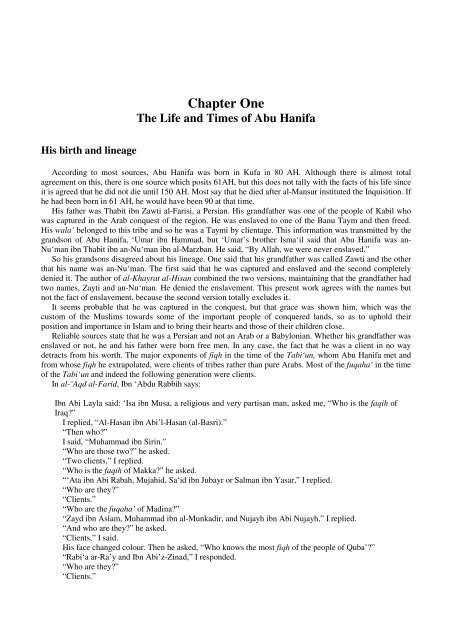Create successful ePaper yourself
Turn your PDF publications into a flip-book with our unique Google optimized e-Paper software.
Chapter One<br />
The <strong>Life</strong> <strong>and</strong> Times of <strong>Abu</strong> <strong>Hanifa</strong><br />
<strong>His</strong> birth <strong>and</strong> lineage<br />
According to most sources, <strong>Abu</strong> <strong>Hanifa</strong> was born in Kufa in 80 AH. Although there is almost total<br />
agreement on this, there is one source which posits 61AH, but this does not tally with the facts of his life since<br />
it is agreed that he did not die until 150 AH. Most say that he died after al-Mansur instituted the Inquisition. If<br />
he had been born in 61 AH, he would have been 90 at that time.<br />
<strong>His</strong> father was Thabit ibn Zawti al-Farisi, a Persian. <strong>His</strong> gr<strong>and</strong>father was one of the people of Kabil who<br />
was captured in the Arab conquest of the region. He was enslaved to one of the Banu Taym <strong>and</strong> then freed.<br />
<strong>His</strong> wala’ belonged to this tribe <strong>and</strong> so he was a Taymi by clientage. This information was transmitted by the<br />
gr<strong>and</strong>son of <strong>Abu</strong> <strong>Hanifa</strong>, ‘Umar ibn Hammad, but ‘Umar’s brother Isma‘il said that <strong>Abu</strong> <strong>Hanifa</strong> was an-<br />
Nu‘man ibn Thabit ibn an-Nu‘man ibn al-Marzban. He said, “By Allah, we were never enslaved.”<br />
So his gr<strong>and</strong>sons disagreed about his lineage. One said that his gr<strong>and</strong>father was called Zawti <strong>and</strong> the other<br />
that his name was an-Nu‘man. The first said that he was captured <strong>and</strong> enslaved <strong>and</strong> the second completely<br />
denied it. The author of al-Khayrat al-<strong>His</strong>an combined the two versions, maintaining that the gr<strong>and</strong>father had<br />
two names, Zayti <strong>and</strong> an-Nu‘man. He denied the enslavement. This present work agrees with the names but<br />
not the fact of enslavement, because the second version totally excludes it.<br />
It seems probable that he was captured in the conquest, but that grace was shown him, which was the<br />
custom of the Muslims towards some of the important people of conquered l<strong>and</strong>s, so as to uphold their<br />
position <strong>and</strong> importance in Islam <strong>and</strong> to bring their hearts <strong>and</strong> those of their children close.<br />
Reliable sources state that he was a Persian <strong>and</strong> not an Arab or a Babylonian. Whether his gr<strong>and</strong>father was<br />
enslaved or not, he <strong>and</strong> his father were born free men. In any case, the fact that he was a client in no way<br />
detracts from his worth. The major exponents of fiqh in the time of the Tabi‘un, whom <strong>Abu</strong> <strong>Hanifa</strong> met <strong>and</strong><br />
from whose fiqh he extrapolated, were clients of tribes rather than pure Arabs. Most of the fuqaha’ in the time<br />
of the Tabi‘un <strong>and</strong> indeed the following generation were clients.<br />
In al-‘Aqd al-Farid, Ibn ‘Abdu Rabbih says:<br />
Ibn Abi Layla said: ‘Isa ibn Musa, a religious <strong>and</strong> very partisan man, asked me, “Who is the faqih of<br />
Iraq?”<br />
I replied, “Al-Hasan ibn Abi’l-Hasan (al-Basri).”<br />
“Then who?”<br />
I said, “Muhammad ibn Sirin.”<br />
“Who are those two?” he asked.<br />
“Two clients,” I replied.<br />
“Who is the faqih of Makka?” he asked.<br />
“‘Ata ibn Abi Rabah, Mujahid, Sa‘id ibn Jubayr or Salman ibn Yasar,” I replied.<br />
“Who are they?”<br />
“Clients.”<br />
“Who are the fuqaha’ of Madina?”<br />
“Zayd ibn Aslam, Muhammad ibn al-Munkadir, <strong>and</strong> Nujayh ibn Abi Nujayh,” I replied.<br />
“And who are they?” he asked.<br />
“Clients,” I said.<br />
<strong>His</strong> face changed colour. Then he asked, “Who knows the most fiqh of the people of Quba’?”<br />
“Rabi‘a ar-Ra’y <strong>and</strong> Ibn Abi’z-Zinad,” I responded.<br />
“Who are they?”<br />
“Clients.”














